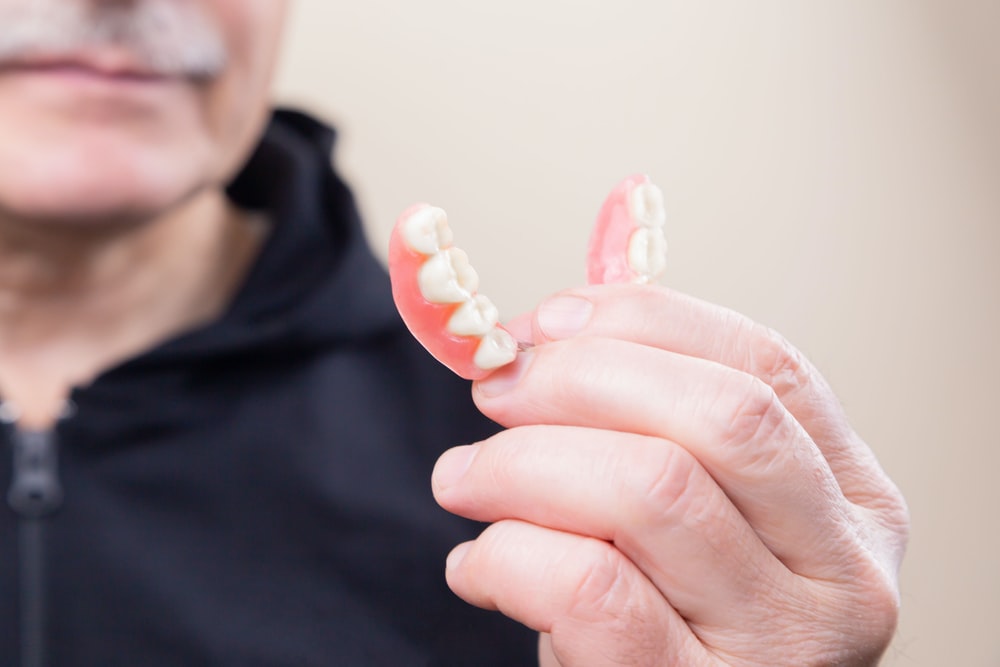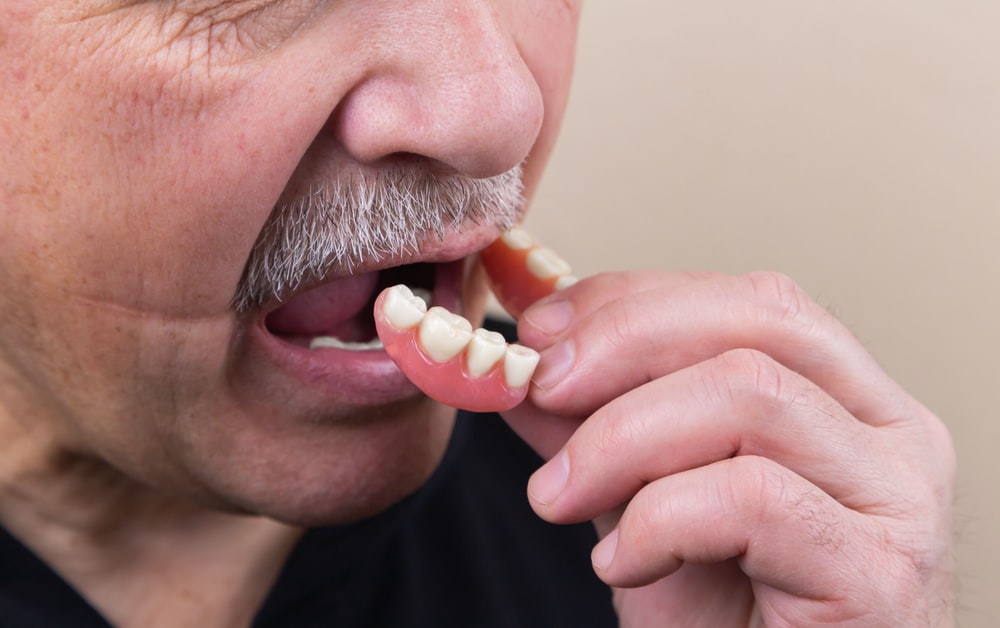Congratulations on your new Dentures!
We have designed and fabricated your New Dentures paying a lot of attention to your concerns and present oral (mouth) condition, so that maximum function and aesthetics (looks) is restored. Remember! Your dentures are not and will not be the same as your natural teeth. With a little bit of patience, co-operation and practise, you will be able to function comfortably with your dentures. If you had a new Removable Complete Dentures, you should follow these instructions as far as possible. Following these Instructions will help you heal quickly and stay comfortable. In case you experience any complications, you are requested to contact our front office immediately.
Adjustment Phase
- Your current oral (mouth) condition is unique. Following the delivery of new dentures there is a variable adjustment phase (generally 2-6 weeks) during which patient jaws and tissues adjust and accommodate. New dentures often feel bulky and awkward at first. Soft tissues of the mouth, now covered, may have been open or left uncovered by a previous denture. This strangeness, although bothersome, is a temporary problem that is usually resolved during the adjustment period. Your previous experience with dentures or the experience of other denture patients occurred under different circumstances and should therefore not be compared
- Your dentures will ‘settle’ in a month’s time. Patients often state that their relatives or friends had “no problem getting used to their dentures” and that they could chew well from the first day. Unfortunately, patients soon forget the difficult adjustment period once their dentures have become second nature. The ability to function with dentures involved learned neuro-muscular skills that take time to develop. Although the time may vary and depend on a number of factors, all new denture wearers will require this adjustment period. Please be patient and follow all instructions meticulously during this period to see good results.
- Because the now artificial tooth may be placed in slightly different relationships and the plastic denture base may feel bulky, speech patterns are often temporarily interrupted. The muscles of the tongue, lips and cheek must learn to coordinate movement to allow normal speech. The learning process can be enhanced by practice. Reading aloud is one way to minimize the time required to recover normal speech patterns. Continued difficulty should be brought to our attention.
- During this adaption period you may experience: Sore spots, Difficulty in eating and speaking, Looseness or tilting of denture, Cheek/lip biting, Frustration.
Saliva
A normal response of the body to new dentures is increased salivary flow. So Some patients experience abundance of saliva which is stimulated by the presence of the new dentures. The glands try to wash out the strange “foreign body”. Soon the salivary glands will adjust to the presence of the dentures and resume their normal production. Until then, you should simply swallow more frequently. This situation may persist for several weeks but will gradually disappear.
Eating with New Dentures
Again, it will take practice to learn to eat a fairly normal diet with the introduction of new dentures. During the first several days we recommend a soft diet to allow us to eliminate potential sore spots with a minimum of discomfort and to make the learning period more tolerable. Avoid tough, hard and sticky foods until you become more experienced.
- Day 1 and Day 2: Do not use the dentures for eating. As your dentures are new and are getting adapted to the oral (mouth) conditions, forces applied during chewing could disturb the ‘settling’.
- Week 1: Limit your diet to soft, boiled food. Trying to eat hard or chewy food the first week can be difficult and cause sore spots and blisters.
- As you learn to use them, you can gradually increase the hardness of the food you eat. Biting very hard food could always be a concern. Although some experienced complete denture wearers can eat a normal diet including apples, salads and corn on the cob this is probably the exception rather than the rule. Most full denture patients will find some restrictions in the foods they can manage.
- Biting with your front teeth will always cause the dentures to dislodge. Try to use your back teeth and bite food off using the corners of your mouth. Eat slowly and cut food into small pieces.
- Excessive opening of the mouth will cause the denture to dislodge. Limit yawning with your palm placed against your chin, eat smaller bites of food, always sip fluids or drink with a straw.
- It is advisable to avoid very hot and very cold beverages with the dentures.
- Place one piece of food on both sides of your mouth before chewing. Chewing food on both sides of your mouth at the same time reduces tilting and dislodgement. Although the normal tendency is to chew on one side or the other, denture wearers may function better by chewing with food on both sides over the back teeth at the same time. (This helps to balance the forces on the denture). Avoid, when possible, bringing the lower front teeth forward and against the upper front teeth to cut or incise foods. (This protects the delicate upper front ridge and prevents tipping of the denture).
Speech
It is common to experience changes in speech. Do not be overly conscious of the denture. Practise reading and talking aloud in front of the mirror or with family.
Adjustment and Follow up Appointments
- All new dentures require some adjustment. Adjustments for sore spots and other changes will be made at scheduled adjustment appointments.
- During the process of adjustment, if sore spots or blisters are unbearable/ visible- please discontinue the denture and call/ visit us.
Regular Tissue Care
- Remove your dentures every night .This allows your gums to heal, rest and recover from wearing the dentures.
- Dentures may get dislodged in your sleep and may prove dangerous. As a safety measure, please remove the denture whenever you go to sleep.
- Massaging the gums with your clean finger will keep them firm and resistant to denture irritation.
- Unhealthy gums could deteriorate the stability and fit of your denture.
Removal and Insertion of Dentures
If you are new to dentures, it may take a while to adapt to inserting and removing your dentures. With practise, you will be able to do the same with ease.
- The lower denture should be inserted first, followed by the upper denture.
- Once inserted, hold the denture in place until its set comfortably in the mouth to avoid embarrassing dislodgements (removal) during the day.
Care of your New Dentures
Remove and rinse your dentures after every meal. Then rinse your mouth and replace the dentures.
- Remember to rinse after Tea/ Coffee and other coloured drinks.
- At least once a day:
i. Use a toothbrush to scrub the teeth and outside surface of dentures clean.
ii. Apply a small amount of regular mild hand/body soap/toothpaste while brushing under water. This will remove debris and odor causing bacteria.
iii. Wet dentures are slippery. Be careful not to drop your dentures. Dentures dropped onto a hard surface may result in fracture.
- When removing dentures at night, keep them wet by soaking CLEAN dentures in water at room temperature. Never use hot/ warm water to clean or soak the dentures. Replace the water every day. If and as instructed- use denture cleansing tablets/ powder once a week.
Annual Dental Visits
- All complete denture wearers should visit their dentist once a year to help maintain their oral health.
- Over time, the supporting gum tissues and bone will shrink due to age and hormonal changes resulting in looseness and ill fit of the dentures. To an extent, the fit can be corrected. Beyond a point, the dentures will have to be replaced. Continuing to wear ill fitting dentures can be detrimental to your oral condition.
- Dentures may chip/ wear with time.

















